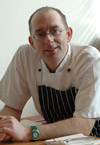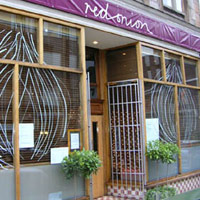 ][1]
][1]The chef patron of Red Onion on Glasgow’s West Campbell Street, John Quigley is a well known face on Glasgow’s restaurant scene. For the last fifteen years, he has been working on or around the city’s Bath Street in places such as The Arthouse, Mojo and the old Quigley’s. He cut his chops working in London in the mid Eighties with chefs such as Alastair Little, Simon Hopkinson and Rowley Leigh before going on to become a tour chef for artists including Bryan Adams, Tina Turner and The Bee Gees.
Taking a break from the kitchens at Red Onion, he tells 5pm how he is surviving the recession, eating poisonous fugu fish and, possibly more life-threatening, touring with Guns ‘n’ Roses.
These days, rather than rattling around a tour bus, Quigley is happier working at Red Onion with his wife Gillian and writing a Red Onion recipe book for sale in his restaurant.
Q) Let’s get the rock ‘n’ roll stuff done. Did any of the pop and rock stars you cooked for have weird requests?
JQ) Most of them have very boring and normal eating habits. However, for a while, I was working for Guns ‘n’ Roses and in six weeks I never saw anything solid pass their lips. Then one day we were in Stockholm and Slash had just got out of his bed. It was about five o’clock in the afternoon. He staggered out of the tour bus and into the catering area. He asked where we were and I told him that we were in Sweden.
He said, ‘OK I guess we’d better eat some reindeer.’
That night, we had twelve reindeer roasting on spits in the car park. True to form, Guns ‘n’ Roses came off, fell asleep and then woke up at four in the morning when everything was ruined. It was just another extraordinary waste of time and money.
Morrissey had a bizarre entourage. Lots of guys with handlebar moustaches and chaps. Every night, one of his entourage would come up and say that Morrissey would like asparagus and puff pastry, filo parcel with sauté mushrooms and a veloute of tarragon and so on. I would get three different demands from his entourage and then every night Morrissey himself would come off stage and say, ‘I want a cheese sandwich’.
Q) What was Bryan Adams like to cook for?
JQ) I cooked for Bryan Adams for five years so that was five years of my life cooking for a vegan who didn’t like vegetables. Fortunately, he didn’t classify vegetables as potatoes. That was possibly the worst diet I’ve ever encountered in my life but that’s what the man wanted so it’s what we did.
He had a sweet tooth though so one thing that came out of it was that by the time we had finished, I was quite a capable vegan baker. It’s a niche skill.
Q) Was it frustrating in some senses?
JQ) A lot of the time it was, yes. I got into the business not because I was star struck or wanted to cook for celebrities, I wanted to travel. That was the bottom line. As a chef coming through in London, when I was about 24 or 25, I knew that I had to travel and see things first hand. I had travelled Europe pretty extensively by myself and with my parents but I wanted to see the world for my cooking purposes. I realised that this was a way of doing it.
Q) Did it work out like that?
JQ) I saw a lot but it was frustrating cooking for someone like The Bee Gees. I was on a tour with them and we were in Paris. I was thinking, ‘I must go to the famous Rungis market’. They were like, ‘It’s Sunday so we want roast beef and Yorkshire puddings.’
Some of them were interesting. Someone like Mick Hucknall is a foodie and that was fun.
Q) The recession was hard last year for many restaurants. How was it for you?
JQ) It bit on the first of January last year. The Christmas before last, the Christmas trade acted as a buffer for us. The reservations were in the book, they got done and we got through that Christmas period. The signs of the recession were all there but as soon as the 1st of January came around, it really bit and the hatches went down.
I’m the head chef but I was employing someone on head chef’s salary. That was bit of a luxury for me and I had to do something about that. So it was back to the coal face in that respect. I also took a much closer and harder look at the menu and buying. I put on more of a business man’s head.
 ][3]
][3]Q) Did you change what you were cooking?
JQ) I like to think that I’ve always done back to basics cooking but the days of throwing a rack of lamb on the grill and charging £20 for it were gone. At the same time that people had less money to spend on going out, food prices went up a whack as well. It was a real double whammy.
What we did was look at, say, other cuts of lamb and put the work into them to produce a dish that is just as worthy as the rack of lamb. At the end of the day, it was about good housekeeping and back to basics cookery. That was what got us through it.
Another element was that 5pm, to a certain extent, was very beneficial in terms of people who were looking for offer-led food. I made my 5pm menu bigger and that worked.
Last year wasn’t about making money. It was about paying bills and wages. We also made our website work harder for us. We made our wine list work harder for us. A lot of things that we had taken for granted suddenly weren’t taken for granted at all.
Q) In a wider sense, how do you think the restaurant business in Glasgow fared?
JQ) The city itself came through well in the summer. There were lots of big events at Hampden. Once or twice a week there was something pulling upwards of 20,000 people through the city. Whether it was a concert, a Homecoming event or a football game, there were things happening.
Once we got through the summer it was back to business and this year is looking encouraging in terms of the conferences which are a huge part of our business now.
Q) Are you optimistic about the coming year?
JQ) I am at the moment. Our business has evolved over the last five years. Working at The Arthouse, Mojo, the old Quigley’s and now here, I’ve been in the Bath Street area for coming on for fifteen years now. The core of the business around here always used to be lunch. Lunch was forty to fifty covers consistently and a double cover on a Friday. That was the core of my business and then Saturday nights have always been Saturday nights in Glasgow.
That has changed. The lunch market is more or less gone. The expense account lunch has gone and people don’t spend as much at lunch generally. Instead, there is a more consistent evening trade. Our Monday to Thursday evenings are now our bread and butter with business travellers, people on city breaks and people visiting the city for one reason or another.
Q) You have done telly and other media work as a chef. Do you think that the celebrity chef phenomenon has helped?
JQ) Everybody is more food aware and I think that the celebrity chef thing has been beneficial over the piece.
Q) Do you really believe that it is changing the way people cook?
JQ) Maybe. Maybe. In the West of Scotland, it hasn’t changed. At a lower income level, it hasn’t changed at all. It won’t change until shops like Farmfoods stop offering five frozen chicken curries for a fiver. If that is on offer then people won’t go home and cook fresh food.
The middle class is watching the celebrities and then going out, buying the ingredients and having a bash at it.
Q) Do you think that there is a generation growing up now that can’t cook?
JQ) I’ve heard arguments both ways and it’s hard to say whether we are better cooks or not. Perhaps our parents weren’t great cooks but they had some life skills. I do come across some really scary knowledge gaps. We have a 23 year old waitress who is a primary school teacher and she can’t make soup. I had a guy in here washing dishes who could not peel a potato. He was rubbing the potato against the peeler. He is applying for Oxford and while peeling spuds may not be relevant to getting in there, it’s a useful life skill.
Q) Surely not? Can’t everyone peel a spud?
JQ) I go back to my old school occasionally and teach the kids there as part of the home economics course. This is going back a few years now but I asked one kid to wash the potatoes. When I turned back, he had them in the sink with Fairy Liquid. I remember there was a fourteen year old boy who refused to believe that chips came from a potato.
Q) I suspect that you might have a good answer to this question. What’s the strangest thing you’ve eaten?
JQ) Over the years spent travelling, I’ve tried everything from insects and reptiles to mountain lion cub in Mexico City although that was probably just a big cat. I’ve eaten (poisonous) fugu fish in Japan. It’s not fishy like most sashimi. It’s probably closest to turbot and has the same meatiness. It gives your tongue a slight tingling and then numbing sensation. If that spreads to your fingers and toes then you’re a goner.
